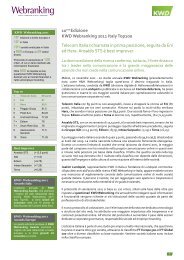What We Know About the Business of Digital Journalism
What We Know About the Business of Digital Journalism
What We Know About the Business of Digital Journalism
You also want an ePaper? Increase the reach of your titles
YUMPU automatically turns print PDFs into web optimized ePapers that Google loves.
Columbia <strong>Journalism</strong> School | Tow Center for <strong>Digital</strong> <strong>Journalism</strong>Conclusion“Here’s <strong>the</strong> problem: Journalists just don’t understand <strong>the</strong>ir business.”That’s <strong>the</strong> diagnosis from Randall Ro<strong>the</strong>nberg, a former New York Times mediareporter who heads <strong>the</strong> Interactive Advertising Bureau, a trade group representingpublishers and marketers.Whe<strong>the</strong>r or not you agree with his sweeping characterization, it’s clear thatmany sectors <strong>of</strong> <strong>the</strong> traditional news industry have been slow to embrace changesbrought on by digital technology. They also have been flummoxed by competitorswho invest minimally in producing original content but have siphoned <strong>of</strong>fsome <strong>of</strong> <strong>the</strong> most pr<strong>of</strong>itable parts <strong>of</strong> <strong>the</strong> business.At <strong>the</strong> same time, digital journalism has created significant opportunities fornews organizations to rethink <strong>the</strong> way <strong>the</strong>y cover <strong>the</strong>ir communities. And inseveral organizations, old and new, we see promising signs that a transformedindustry can emerge from <strong>the</strong> digital transition—one that is leaner, quicker and,yes, pr<strong>of</strong>itable.<strong>We</strong> do not believe that legacy platforms should be disregarded or disbanded.It simply is not reasonable to assume that any company would cast aside <strong>the</strong> part<strong>of</strong> its business that generates 80 to 90 percent <strong>of</strong> its revenue. But we do thinkthat companies ought to regard digital platforms and <strong>the</strong>ir audiences as being ina state <strong>of</strong> constant transformation, one that demands a faster and more consistentpace <strong>of</strong> innovation and investment.To that end, we <strong>of</strong>fer <strong>the</strong>se recommendations:• <strong>Digital</strong> platforms have been treated too <strong>of</strong>ten by traditional news organizationsas just ano<strong>the</strong>r opportunity to publish existing content. Many sites arefilled with “shovelware”—content that amounts to little more than electroniceditions <strong>of</strong> words and pictures from traditional platforms. But, as wehave seen, publishers can build economic success by creating high-value,less-commoditized content designed for digital media. New York Magazine’ssuccessful site gets little traffic from print-edition stories; KSL.com’s class-Conclusion 129
















